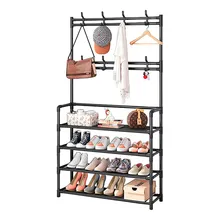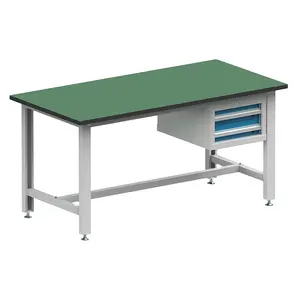Understanding Laboratory Electrical Workbenches
Laboratory Electrical Workbenches are specialized pieces of furniture crafted to meet the distinctive requirements of scientific and research facilities, educational institutions, and various other settings where electrical tasks are central to the work being carried out. These workstations are customized to offer a secure, well-organized, and effective workspace for laboratory staff to conduct experiments, tests, and maintenance on electrical equipment and devices.
Professionals in research and development, quality control, and education predominantly utilize Laboratory Electrical Workbenches. These workbenches are furnished with amenities such as integrated power strips, adjustable shelves, cable management systems, and appropriate lighting to ensure a conducive environment for intricate electrical tasks. The operational foundation of these workbenches hinges on a profound comprehension of electrical safety protocols, ergonomics, and the specific demands of electrical apparatus.
Essentially, Laboratory Electrical Workbenches serve as a regulated environment that facilitates the manipulation of electrical components without jeopardizing their integrity. They are often available in various setups to accommodate diverse types of equipment and can be personalized with additional accessories based on the lab's specific needs or the nature of the experiments being conducted. The utilization of these workbenches spans from basic educational configurations to intricate industrial applications.
Varieties of Laboratory Electrical Workbench
Laboratory electrical workbenches are offered in diverse configurations to meet the distinct requirements of various laboratory settings. Below are some common types:
-
Adjustable Height Workbench: These benches enable users to work at a comfortable height, which is particularly beneficial for tasks that entail prolonged standing or sitting.
-
Mobile Workbench: Featuring wheels, mobile workbenches facilitate easy equipment transportation within a lab or between labs, making them ideal for versatile spaces where flexibility is essential.
-
Anti-Vibration Workbench: Crafted with materials and features that diminish vibrations, these workbenches are vital for research necessitating high precision. They often incorporate specialized surfaces or systems to shield delicate equipment from motion.
-
Clean Room Workbench: Tailored for sterile environments like clean rooms where both the workbench and its surroundings must be free from contaminants. They are equipped with features that simplify cleaning and typically utilize materials such as stainless steel or epoxy resin.
-
Industrial Workbench: Engineered to endure heavy usage with robust materials like cold-rolled steel or aluminum, these benches are designed for manufacturing settings. They commonly have higher weight capacities and may include specialized features like electrical outlets or tool racks.
Selection Criteria for Laboratory Electrical Workbench
Choosing the appropriate laboratory electrical workbench entails considering several factors that align with specific research or operational needs. Here are the aspects that businesses should take into account:
-
Material Durability: The workbench's intended environment determines whether materials like stainless steel or phenolic resin are essential for durability and chemical resistance.
-
Size and Ergonomics: Depending on the available space and the nature of the work, the bench's size should be suitable. Additionally, contemplate the ease of adjusting the bench height to accommodate different user preferences.
-
Electrical Safety: Ensure that the workbench complies with pertinent electrical safety standards to safeguard users from potential hazards in the lab.
-
Storage Needs: Evaluate the necessary storage space for tools, equipment, and frequently used materials in the laboratory setting.
-
Mobility: Opt for a bench with wheels or a design that allows easy relocation for tasks involving movement around the lab or between different work areas.
-
Customization: Given the varying needs of businesses, some suppliers may propose tailored solutions that align the bench's functionality and design with specific requirements.
Alibaba.com's Laboratory Electrical Workbench
Alibaba.com distinguishes itself as a global marketplace that links businesses to a wide array of laboratory electrical workbenches suited for every application, from R&D to manufacturing. With a vast network of suppliers providing customizable solutions tailored to meet distinct industrial requirements, Alibaba.com serves as an indispensable resource for businesses seeking dependable and effective electrical workbenches.
The platform's intuitive interface enables buyers to sift through options by material, design style, application, and even color to pinpoint precisely what they require. Whether it's a heavy-duty metal workbench for a bustling industrial environment or a sleek stainless steel model for a contemporary laboratory setup, Alibaba.com's diverse selection caters to all use cases without compromising on quality or functionality.
Furthermore, Alibaba.com's dedication to facilitating seamless transactions is evident through services like Trade Assurance, which enhances buyer confidence by safeguarding payments until order fulfillment is verified. With such a strong focus on customer satisfaction and the implementation of security measures, businesses can rely on Alibaba.com when sourcing top-tier electrical workbenches that align with their operational needs and budget constraints.
Frequently Asked Questions about Laboratory Electrical Workbenches
What are the applications of a Laboratory Electrical Workbench?
A Laboratory Electrical Workbench is utilized for performing experiments necessitating a controlled environment for electrical components, such as testing and measuring electrical properties, ensuring safety, and averting electrical hazards.
How does a Laboratory Electrical Workbench differ from an Electronics Workbench?
A Laboratory Electrical Workbench is specifically designed to cater to the distinctive requirements of electrical work, featuring built-in power supplies, grounding systems, safety features, and additional amenities like fume extractors that are not typically found in Electronics Workbenches.
Which materials are commonly employed in manufacturing Laboratory Electrical Workbenches?
Commonly used materials in the construction of Laboratory Electrical Workbenches include stainless steel, phenolic resin, epoxy resin, aluminum, and various types of metal frames.
Can Laboratory Electrical Workbenches be customized to fit specific spatial requirements?
Many suppliers offer customization options for Laboratory Electrical Workbenches to align with the dimensions and layout of the available space, ensuring efficient utilization of space in laboratories of all sizes.
What safety features should one seek in a Laboratory Electrical Workbench?
Key safety features to look for include integrated fume extractors, fire-resistant materials, emergency stop buttons, and ground connections to prevent electrocution.
How does the panel type affect the functionality of a Laboratory Electrical Workbench?
The panel type can influence the accessibility of electrical components and the overall stability of the workbench. Opt for a panel type that complements the functionality of your specific tasks.
What design styles are available for Laboratory Electrical Workbenches?
Design styles for Laboratory Electrical Workbenches range from modern and industrial to contemporary and traditional. Select a style that complements your laboratory's existing decor.
Is it feasible to find eco-friendly Laboratory Electrical Workbenches?
Yes, some suppliers offer eco-friendly options for Laboratory Electrical Workbenches, crafted from sustainable materials and designed to be energy-efficient.



































 浙公网安备 33010002000092号
浙公网安备 33010002000092号 浙B2-20120091-4
浙B2-20120091-4